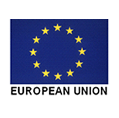EU-OSHA NEWS RELEASE - MAR 24, 2014
Identification of occupational safety and health research priorities will help Europe reach its 2020 goals
The European Agency for Safety and Health at Work (EU-OSHA) has identified key priority areas for occupational safety and health (OSH) research that will help Europe reach its 2020 goals. Priorities have been set around four major themes: (1) demographic change; (2) globalisation and the changing world of work; (3) safe new technologies; and (4) new or increasing occupational exposure to chemical and biological agents.
Setting priorities will allow better coordination of research activities and more efficient allocation of resources in the coming years. This is vital in helping to translate OSH research into practical and accessible workplace solutions that will have an impact on the safety and health of workers.
EU-OSHA’s response to the challenges currently facing Europe are detailed in a report entitled ‘Priorities for occupational safety and health research in Europe: 2013–2020’. The report emphasises the fact that OSH research can contribute to meeting the goals set by the Europe 2020 strategy and the Horizon 2020 programme for smart, sustainable and inclusive growth.
Dr Christa Sedlatschek, Director of EU-OSHA, said: ‘At this time of economic crisis, a Europe-wide OSH strategy is needed more than ever, and issues related to safety and health at work need to be placed high on the political agenda. The link between OSH, competitiveness and business performance must be emphasised. Social stability and sustainability should go hand in hand with economic growth.’
She added: ‘EU-OSHA has a key role to play in ensuring that high-level OSH research is translated into practical, grass-roots workplace solutions. It is vital that the Agency coordinates the research and communicates the risks to both workers and employers.’
Therefore, EU-OSHA intends to follow-up on this report and will organise a seminar in 2014 to discuss a short-list of OSH research priorities and next steps to be taken.
Taking into account the latest developments in scientific knowledge in the field, changes in the world of work and trends that have an impact on OSH, the report considers challenges such as:
• Demographic change – as the population of Europe ages, the challenge is to enable older workers to remain active and productive for longer and increase the proportion of older workers in employment. An increase in female employment rates means that we need a better understanding of the OSH issues that specifically affect women. Migration is also adding to the diversity of the workforce. We need to understand how to adapt workplace design and work organisation to address these changes in the make-up of the workforce.
• Globalisation and the changing world of work – restructuring of organisations, the spread of information and communications technology and a shift from manufacturing to services have all led to job insecurity, work intensification, new working patterns and often unsociable working hours. These increase workers’ exposure to psychosocial risks. We need a better understanding of the links between psychosocial risk factors and morbidity and mortality to develop effective prevention strategies.
• New technologies – as Europe progresses towards a greener, more sustainable economy, there is an increased focus on renewable energy technologies and on waste management and recycling. These relatively new and still progressing industries bring new risks, for example exposure to electromagnetic fields or to biohazards. We need to understand these risks and ensure that OSH research is integrated in the design and development of all new processes and technologies – prevention through design.
• Exposure to chemical and biological agents – fatal occupational accidents are decreasing but fatalities arising from occupational diseases are increasing. The development of innovative products and materials and the shift towards a resource-efficient, low-carbon economy has led to new technologies and this has brought about new OSH challenges. Workers are exposed to an increasing number of biological and chemical agents, endocrine disruptors, new technologies such as nanotechnology and the combined or mixed exposures to dangerous substances. We need improved detection and identification methods to ensure the safe use of these chemical and biological agents.
These OSH research priorities were discussed within the context of the Europe 2020 strategy and the Horizon 2020 programme at a seminar in Brussels on 8–9 October 2013 entitled ‘Moving towards 2020 – priorities for OSH research for the years 2013-20’. The seminar was attended by research directors and representatives of funding bodies, Member States and the European Commission.
Links
Read the full report (in English)
Read the summary (in English)
Presentations and speeches from the seminar
Notes to editors
1. The European Agency for Safety and Health at Work (EU-OSHA) contributes to making Europe a safer, healthier and more productive place to work. The Agency researches, develops, and distributes reliable, balanced, and impartial safety and health information and organises pan-European awareness raising campaigns. Set up by the European Union in 1996 and based in Bilbao, Spain, the Agency brings together representatives from the European Commission, Member State governments, employers’ and workers’ organisations, as well as leading experts in each of the EU-28 Member States and beyond.
2. Europe 2020 is the EU’s growth strategy for the coming decade. It aims to make Europe a smart, sustainable and inclusive economy to help the EU and the Member States deliver high levels of employment, productivity and social cohesion. The EU has set five ambitious objectives – on employment, innovation, education, social inclusion and climate/energy – to be reached by 2020. Each Member State has adopted its own national targets in each of these areas.
Press inquiries
- Birgit Müller - International press
- +34 94 479 35 52 news@osha.europe.eu
- Marta Urrutia - Spanish press
- +34 94 479 57 46 noticias@osha.europa.eu
- Brenda O’Brien - Brussels Liaison Office
- +32 2 401 68 59 obrien@osha@europa.eu










